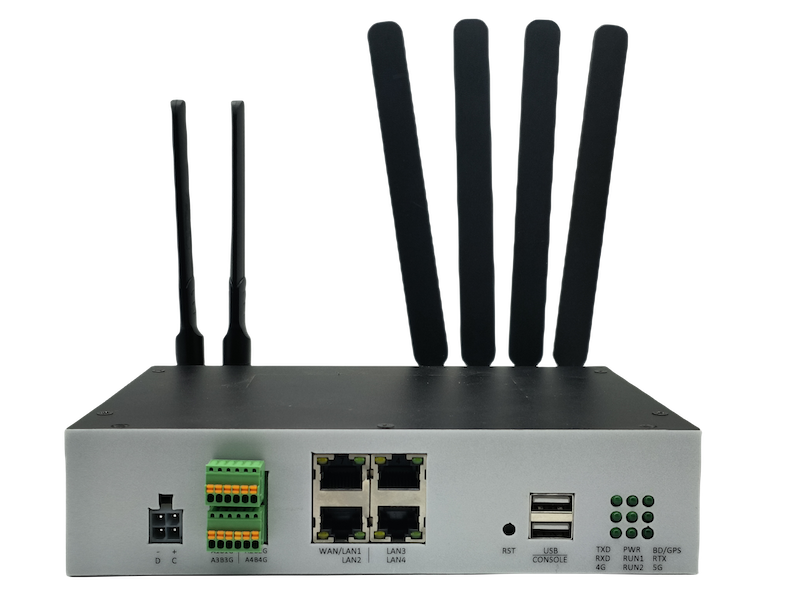In the rapidly advancing world of the Internet of Things (IoT), IoT gateway play a pivotal role in bridging the gap between connected devices and the cloud. As data hubs, these gateways enable seamless communication, ensuring that the vast amounts of data generated by IoT devices are efficiently transmitted, processed, and managed. Whether it’s an IoT expert designing solutions for logistics, IoT device manufacturers developing smart gadgets, or digital transformation workshop brainstorming next-gen ideas, IoT gateway are the backbone of IoT ecosystems.
These gateways serve as intermediaries, enabling connectivity between devices with different protocols, ensuring data security, and supporting advanced analytics. As IoT in energy management, IoT telecom, and IoT factory automation continue to expand, IoT gateways are becoming indispensable tools in achieving operational efficiency and scalability.
1. How Do IoT Gateway Work?
IoT gateways act as a bridge between IoT devices, sensors, and the cloud. Here’s how they function:
- Data Collection and Aggregation: IoT gateways collect data from sensors and devices across various networks. For instance, in warehouse temperature monitoring, they gather real-time data on storage conditions.
- Protocol Translation: IoT devices use different communication protocols such as Zigbee, MQTT, or Wi-Fi. IoT gateways translate these protocols, ensuring compatibility and smooth data flow.
- Edge Processing: Modern IoT gateways are equipped with edge computing capabilities, enabling real-time analytics and decision-making directly at the device level. This is crucial for applications like IoT property management, where instant insights can enhance tenant experiences.
- Data Transmission: Once processed, data is transmitted to the cloud for storage, analysis, and visualization. For example, in IoT telecom, gateways help streamline real-time monitoring of network health.
- Security: IoT gateways incorporate encryption and firewall systems to secure data transmission, protecting against cyber threats—a critical feature in sensitive sectors like IoT energy and IoT in factory automation.
2. IoT Gateways vs. Industrial Gateways: What Sets Them Apart?
While IoT gateways and industrial gateways share similarities, they cater to different requirements:
- Application Focus:
- IoT gateways: Designed for broad IoT ecosystems, supporting various applications from digital transformation in logistics to smart homes.
- Industrial gateways: Tailored for factory and industrial environments, focusing on rugged designs and specific automation protocols.
- Data Processing:
- IoT gateways: Emphasize cloud connectivity and real-time insights, crucial for IoT product development and remote management.
- Industrial gateways: Rely heavily on local processing and integration with industrial machinery.
- Scalability:
- IoT gateways: Flexible and scalable, ideal for expanding networks across sectors like IoT telecom and IoT factory automation.
- Industrial gateways: Typically less scalable, designed for fixed factory setups.
- Protocol Compatibility:
- IoT gateways: Support diverse protocols and are optimized for IoT device manufacturers creating interconnected systems.
- Industrial gateways: Specialize in specific protocols such as Modbus or PROFIBUS.
3. Unlocking the Power of IoT Gateways: Key Benefits
Integrating IoT gateway into IoT ecosystems delivers numerous advantages:
- Enhanced Connectivity: IoT gateways ensure seamless communication across devices using varied protocols. This is essential in complex setups like IoT telecom and warehouse temperature monitoring.
- Improved Security: With built-in encryption and secure boot features, gateway provide robust protection against cyber threats, a critical aspect for sectors such as IoT in energy management.
- Edge Computing Capabilities: By processing data locally, IoT gateway reduce latency, enabling faster decision-making. This feature is particularly beneficial for IoT factory automation.
- Scalability: IoT gateway can support expanding networks, allowing businesses to scale their operations without compromising performance. This makes them indispensable for digital transformation workshop and global IoT product development.
- Cost Efficiency: IoT gateway minimize cloud storage and bandwidth usage by processing data locally, reducing operational costs.
4. Challenges You Should Know About IoT Gateways
While IoT gateways offer transformative potential, they also face several challenges:
- Complex Integration: Integrating gateways with diverse IoT devices can be challenging, especially for IoT device manufacturers working with multiple protocols.
- High Initial Costs: Deploying gateways, particularly for large-scale applications like IoT factory automation, requires significant investment.
- Cybersecurity Risks: Despite advanced features, IoT gateway remain vulnerable to cyberattacks, emphasizing the need for continuous updates and monitoring.
- Maintenance: Regular updates and maintenance are essential for optimal performance, which can strain resources in sectors like IoT in energy management.
- Skill Requirements: Operating and maintaining IoT gateway requires skilled personnel, such as an IoT technician, which may limit adoption in smaller enterprises.
5. Applications of IoT Gateways
The versatility of IoT gateways is evident in their wide-ranging applications:
- Digital Transformation in Logistics:
- IoT gateways enable real-time tracking of goods and assets, enhancing operational efficiency and reducing costs.
- IoT Energy Management:
- Gateways support smart grids and energy distribution systems, optimizing energy consumption and reducing waste.
- Warehouse Temperature Monitoring:
- By gathering and analyzing temperature data, IoT gateway ensure optimal storage conditions, preserving product quality.
- IoT Property Management:
- Gateways enhance tenant experiences by supporting smart locks, energy-efficient systems, and remote monitoring.
- IoT Telecom:
- IoT gateways streamline network management and monitoring, ensuring uninterrupted connectivity.
- IoT Factory Automation:
- In manufacturing, IoT gateways connect machinery, sensors, and control systems, improving productivity and reducing downtime.

